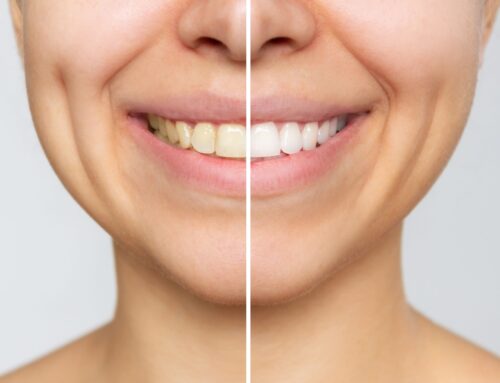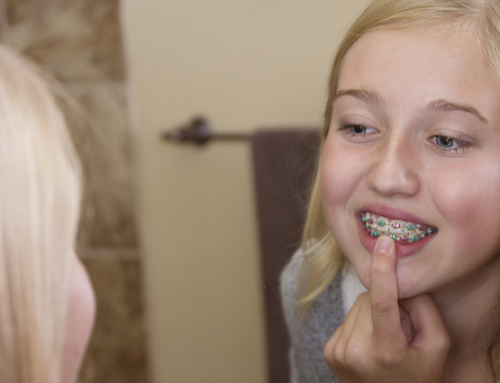
Gum Sensitivity
Toothaches are the worst, but do you ever think about your gums aching? Unless you’re an avid flosser or a dentist, you probably don’t pay much attention to the state of your gums. Now is the time to keep tabs on that vital piece of oral equipment. Gums are the foundation to your teeth and important to take care of on a daily basis.
Causes and Treatments for Sensitive Gums
Healthy gums should be pink and firm. Have your gums ever been unusually red and sore? If you experience any pain when eating, drinking, brushing, and flossing…you may have a gum sensitivity problem.
Gingivitis & Gum Disease
Gingivitis is the number one reason for gum sensitivity in both adults and children! It is inflamed gum tissue, which is a mild and less destructive form of periodontal (gum) disease. One of the initial symptoms in gingivitis is often sore, sensitive gums.
Did you know that most children develop gingivitis? Ask your Nashville dentist about getting your gums checked out because gingivitis can turn into periodontitis, a serious gum infection that is extremely damaging to the mouth.
Brushing & Flossing Too Rough
No need to beat the plaque and tartar off of your teeth. Gently and thoroughly flossing and brushing are all you need to start off a good at home oral care routine. If you find your gums bleed more easily or are inflamed, try being more gentle or buying a soft bristle toothbrush. Parents, practice and teach your kids proper brushing and flossing for a healthier dental future.
Irritation Due to Dental Appliances
It is very common for children AND adults to have braces in this day and age. Sometimes, the brackets or wires may irritate the gums. More often, retainers and mouth guards may take some getting used to. Even dentures can irritate the gums. If this happens, consult your Nashville dentist. Your appliance may need to be professionally adjusted for comfort.
Hormonal Changes and Sensitive Gums
Ever noticed your gums feeling more tender at certain points in life? Blame it on hormones! Fluctuations during puberty, pregnancy, menstruation, or menopause can actually make gums more prone to sensitivity. These shifts may increase blood flow to your gum tissue, causing them to feel swollen, sore, or extra sensitive.
So, if you find your gums unusually achy or uncomfortable and there have been recent hormonal shifts in your life, don’t brush it off—literally or figuratively. Keep an eye on your gum health and talk to your dentist if you notice persistent sensitivity.
How Diabetes Increases Gum Sensitivity
If you’re living with diabetes, your gums might have a tougher job than most. High blood sugar levels can sneak their way into your saliva, creating a playground for plaque and bacteria. When these clever critters aren’t cleared away, your gums become more likely to turn red, sore, or swollen—classic signs of sensitivity. Keeping your glucose in check and sticking to a solid brushing and flossing routine can help keep your gums feeling their best.
Stress and Your Gums
Think stress only messes with your head? Think again! Chronic stress doesn’t just make you feel frazzled—it can actually wreak havoc on your entire body, including your gums. When you’re stressed, your body increases production of cortisol (that pesky stress hormone), which can fuel inflammation everywhere, even in your mouth.
Over time, this inflammation can lead to tender, sensitive gums, making everyday activities like eating and brushing less than pleasant. If you notice your gums aching more when life gets hectic, stress could be a sneaky culprit. Managing stress through relaxation techniques, exercise, or even a favorite hobby can help keep both your mind—and your gums—in better shape.
Try to prioritize getting enough restful sleep each night, and make time for activities that help you relax, whether it’s a walk at Radnor Lake or a quick stretch at home. Regular physical activity, from bike rides to yoga, works wonders for both your mind and your mouth.
Another simple tip? Don’t be afraid to politely decline extra responsibilities if you’re starting to feel stretched thin. Juggling fewer things can help you keep your health (and your gums!) at the top of your to-do list.
Vitamin C Deficiency and Sensitive Gums
You might be surprised to learn that your gums can be affected by what you eat—or what you don’t. Not getting enough vitamin C in your diet can lead to a condition called scurvy, which isn’t just the stuff of pirate legends. When your body is low on vitamin C, it struggles to maintain healthy gum tissue.
This deficiency can make your gums sore, swollen, and more prone to bleeding, especially when you brush or floss. Other side effects of low vitamin C include feeling unusually tired, joint aches, and even random bruises. Eating plenty of vitamin C-rich foods like oranges, strawberries, bell peppers, or broccoli can help fend off these issues and support healthy, resilient gums.
Eating Highly Acidic Foods
Eating and drinking highly acidic foods and drinks can take a toll on your mouth. The best fix is to either steer clear or eat/drink less of these items. Additionally, drink more water to wash away bacteria, increase production of saliva, and get rid of lingering acidic food particles. The following are some foods and beverages (to eat in moderation) that are high in acid:
- Citrus fruit and juices
- Certain cheeses, yogurt, sour cream
- Tomatoes
- Pickled vegetables
- Sports drinks
- Soda
Tooth Sensitivity vs. Gum Sensitivity: How to Tell the Difference
So, how do you know if that zing of pain is a tooth problem or something brewing in your gums? There are some telltale clues:
- Gum sensitivity usually reveals itself as soreness or tenderness along your gum line—often paired with redness, swelling, bleeding when you brush or floss, and sometimes a not-so-pleasant breath situation. The discomfort tends to center around your gums rather than your teeth.
- Tooth sensitivity, on the other hand, makes its grand entrance when you eat ice cream, sip something hot, or even bite into something sweet. The pain comes from inside the tooth itself—often sharp and sudden—typically because of issues like cavities, a loose filling, or worn-down enamel.
If your pain is radiating from your gums and stubbornly lingers, take it seriously—it’s your mouth waving a little red flag. If it’s more of a fleeting twinge triggered by temperature or sweets, your teeth might be asking for help.
When in doubt, keep an eye out for which activities set off your discomfort—it’s a big hint about which part of your mouth needs some TLC. And if the problem sticks around, call your dentist—they’ll know exactly where to look.
Over-the-Counter Medications for Gum Sensitivity
If you find yourself dealing with sensitive or sore gums, there are a few over-the-counter options that can offer relief while your gums heal or until you’re able to see your dentist.
You might consider the following:
- Oral-numbing gels and creams: Products contain numbing agents (typically benzocaine) that can be applied directly to the gums to reduce discomfort. Just be sure not to use benzocaine-containing products on infants or very young children.
- Pain relievers: Non-prescription medications such as ibuprofen or acetaminophen can help ease overall gum pain. Always take these medications as indicated on the packaging.
- Mouth rinses: Some over-the-counter mouthwashes, such as those containing chloraseptic or xylocaine, can temporarily numb sore areas in your mouth.
As a reminder, talk to your dentist if gum pain persists or if you have frequent gum sensitivity—they can help pinpoint the cause and recommend the best treatment for your unique smile.
Prevent Sensitive Gums
First and foremost, take good care of your mouth. Your entire mouth is an integral part to the rest of your health, so why not keep it in working order? If you do develop sensitive gums at any point, it is important to push through the pain to brush and floss more often. Mouthwash can also work wonders. Of course, don’t smoke. In every case of sensitive gum prevention or treatment, a visit to the dentist is a good idea.
First and foremost, take good care of your mouth. Your entire mouth is an integral part to the rest of your health, so why not keep it in working order? If you do develop sensitive gums at any point, it is important to push through the pain to brush and floss more often. Mouthwash can also work wonders. Of course, don’t smoke. In every case of sensitive gum prevention or treatment, a visit to the dentist is a good idea.
More Tips for Preventing and Soothing Sensitive Gums
- Brush and floss gently, but thoroughly. Use a soft-bristled toothbrush and take your time—no need to scrub like you’re cleaning a stubborn stain! Gentle technique keeps your gums happy and healthy.
- Rinse with an antiseptic mouthwash. This helps kill bacteria and can offer relief if your gums are feeling fussy.
- Don’t skimp on vitamin C. Load up on fruits and vegetables, or consider a daily multivitamin to help your gums stay strong.
- Drink plenty of water. If you can’t brush after meals, swishing water can help wash away lingering food particles and acids.
- Put cigarettes out for good. Smoking is a major culprit behind gum problems, so give your gums (and the rest of your body) a break by quitting.
- Manage your stress. Believe it or not, stress can affect your oral health. Make time for rest, exercise, and fun—your mouth will thank you.
- Try over-the-counter relief. If a mouth sore is making your gums extra sensitive, oral-numbing gels or mild pain relievers like ibuprofen or acetaminophen can help—just be sure to follow package directions and avoid numbing gels for infants.
Remember, consistency is key—little habits add up to big results for your gums.
Dental Treatments for Gum Disease Sensitivity
What if gentle brushing and good intentions just aren’t cutting it? Sometimes, at-home efforts are no match for stubborn gum issues. If your gum soreness or sensitivity is sticking around—or, yikes, getting worse—it’s definitely time to give your dentist a call.
Dentists have a few tricks up their sleeves to help restore gum health and comfort:
- Professional Cleanings: For early-stage gum disease like gingivitis, your dental hygienist can perform a thorough cleaning to clear away plaque and tartar from those hard-to-reach spots.
- Scaling and Root Planing: Sounds fancy, but this deep-cleaning treatment dives below the gumline to remove buildup and smooth the tooth roots, helping gums reattach and heal.
- Follow-Up Care: Your dentist may recommend special mouthwashes, more frequent cleanings, or instructions tailored just for you.
Remember—when in doubt, get checked out! Treating gum issues early can prevent bigger headaches (and toothaches) down the line.
Get in Touch!
They say prevention is the best treatment, so contact your Nashville pediatric dentist today – we see parents too! Is your child sprouting another tooth and complaining of gum soreness, or are you dealing with red, sore gums because you love sodas? Request an appointment to get any questions answered and those teeth routinely cleaned. Plus, it may not hurt to pick out a new toothbrush.





